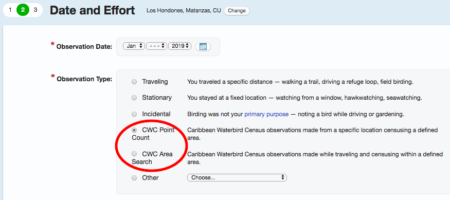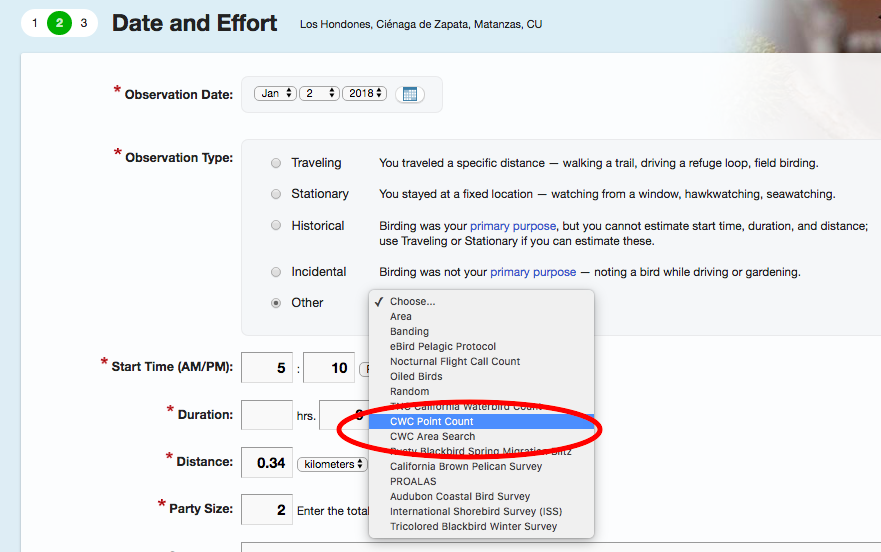The 2020 Caribbean Waterbird Census: Join us from Jan 14th – Feb 3rd

The 11th annual Caribbean Waterbird Census (CWC) starts on Tuesday January 14th and we need your help surveying all types of waterbirds on your island! Anyone can participate in the CWC. Grab a friend, head out to your nearest wetland or beach, and record the birds you see. Detailed information about how to conduct surveys can be found here.
Starting in 2010, dedicated bird enthusiasts have ventured into wetlands across the Caribbean to systematically survey all types of waterbirds (shorebirds, seabirds, wading birds, marshbirds, and waterfowl) each January 14th to February 3rd. The Caribbean is home to over 185 species of waterbirds, including a number of endemic and globally threatened species and many migrants. A structured, ongoing survey is essential for understanding how to best conserve this exceptional group of birds and manage their habitats.
Increasing Caribbean eBird Presence
For all eBird records for the year 2019, there were 36 countries and regions across the world that doubled their eBird growth compared to 2018. We are so excited that 4 Caribbean countries were among them! Saint Martin (French part) (265.52% growth), Turks and Caicos Islands (204.3%), Sint Maarten (115%), and Antigua and Barbuda (101%). Joining the CWC in 2020 is a great way to keep the momentum going and to continue putting the Caribbean and its birds on the global stage! In 2019, the three-week CWC period yielded a total of 321 checklists from 19 countries.
The CWC Is an Important Tool for Conservation
Since 1900, 64% of the world’s wetlands have disappeared, and the Caribbean region is no exception to this crisis. Wetlands are in urgent need of conservation. They are unique ecosystems that provide critical habitats to specialist species. Yet, they face many threats ranging from complete conversion due to development, degradation due to pollution and introduced species, and loss due to sea-level rise.
The waterbirds that rely on wetlands not only face the threats of their habitat being altered or destroyed but also hunting and introduced predators. In order to properly manage habitat for waterbirds in the Caribbean, we need to understand waterbird population trends. In addition, monitoring the health of waterbird populations and their habitats is beneficial to both birds and people, since we rely on the same habitats for our health and well-being.
The CWC is an important tool for monitoring how hurricanes effect bird abundance and distribution. In 2017, Hurricanes Irma and Maria wreaked havoc in the Caribbean, damaging fragile wetland ecosystems. Results from the CWC in 2018 several months later were concerning, with our counters reporting dramatic declines in common bird species. The CWC in 2019 revealed encouraging numbers, especially for shorebird populations. We look forward to the 2020 CWC to know if bird diversity and abundance have continued to recover. In addition, we anxiously await results from areas hit by Hurricane Dorian in September 2019.
In addition, survey data can be used as a tool to designate habitats that are essential for birds. The Cargill Salt Ponds in Bonaire were designated a Western Hemisphere Shorebird Reserve Network (WHSRN) site of Regional Importance as a direct result of survey efforts. With the survey data we collected, our team was able to provide evidence that the site met the criteria for listing. Now, Cargill is dedicated to managing habitat for shorebirds on their property. It’s amazing what birding can achieve!
Good luck, have fun, and we look forward to hearing about your findings. If you have any photos to share, please share them on our BirdsCaribbean Facebook page.
Banded Birds
Be sure to be on the lookout for banded birds! Especially Piping Plovers, Red Knots, Semipalmated Sandpipers, Ruddy Turnstones, and Sanderlings. You may report your sightings to BandedBirds.org and the USGS Bird Banding Lab which oversee all banding in the United States.
Need Help?
Find a tricky shorebird in winter plumage that you can’t identify? Need help setting up an eBird account? Want to participate in the CWC but you’re not sure how to get started? Please contact BirdsCaribbean’s Waterbird Program Manager, Jessica Rozek Cañizares at jessica.rozek@birdscaribbean.org.
Entering CWC Data in eBird
CWC data is stored on eBird Caribbean. If you participate in the CWC, it’s very important that you enter your data through this website using the correct protocol on Step 2, because this is where we collate all the data used for analyses. We don’t want to miss a single bird or site! Simply making an eBird list during these dates is not enough- the protocol is required for it to be CWC data.
If you are using a desktop computer to enter your data:
- Sign into your account on ebird.org/Caribbean
- Enter location information
- Select the appropriate CWC protocol under Observation Type
If you recorded your CWC data using the mobile eBird app:
After you have submitted your checklist on your smartphone:
- Log into eBird on a desktop computer
- Click on “My eBird” at the top of the screen
- Click on “Manage My Checklists” on the right menu
- For your CWC checklist, click on “View or Edit”
- Click on “Edit Date and Effort”
- For Observation Type, select “Other” and then choose the appropriate CWC protocol


